
Talks
Copyright (and all rights therein) of any documents distributed on this website are maintained by the authors or by other copyright holders, notwithstanding that they have offered their works here electronically. It is understood that all persons copying and/or sharing this information will adhere to the terms and constraints invoked by each author’s copyright. These works may not be redistributed without the explicit permission of the copyright holder.
Recorded Talks and Other Presentations Available Online
Please click on image on the left to access content
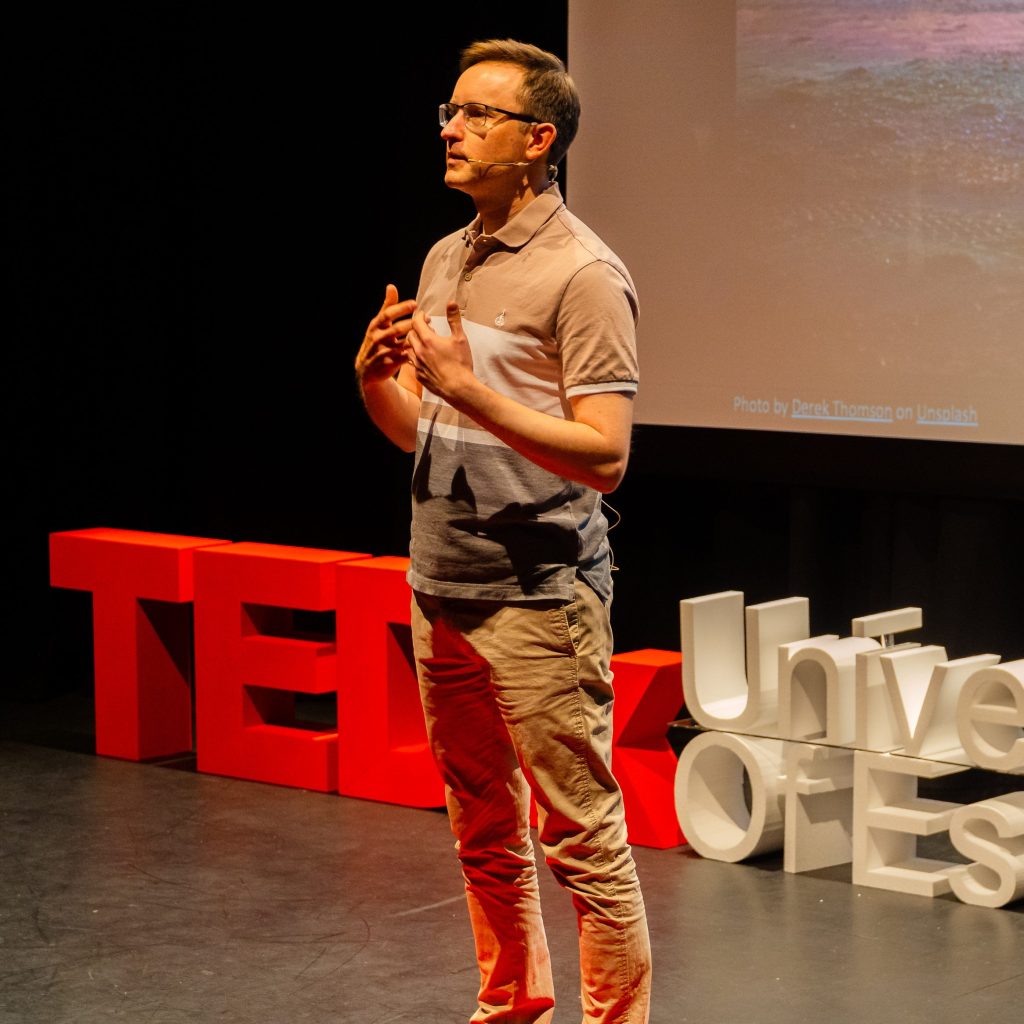
TEDx University of Essex 2022 Talk “Caring Dads: The Making of Involved and Confident Fathers” presented by Dr Vrticka on May 14, 2022 at the TEDx event “Are you paying attention?”.

Podcast as part of Why? Podmasters UK series on “Are dads wired differently?” hosted by Dr Anna Machin with Dr Vrticka as guest. Released on 25 December 2023.
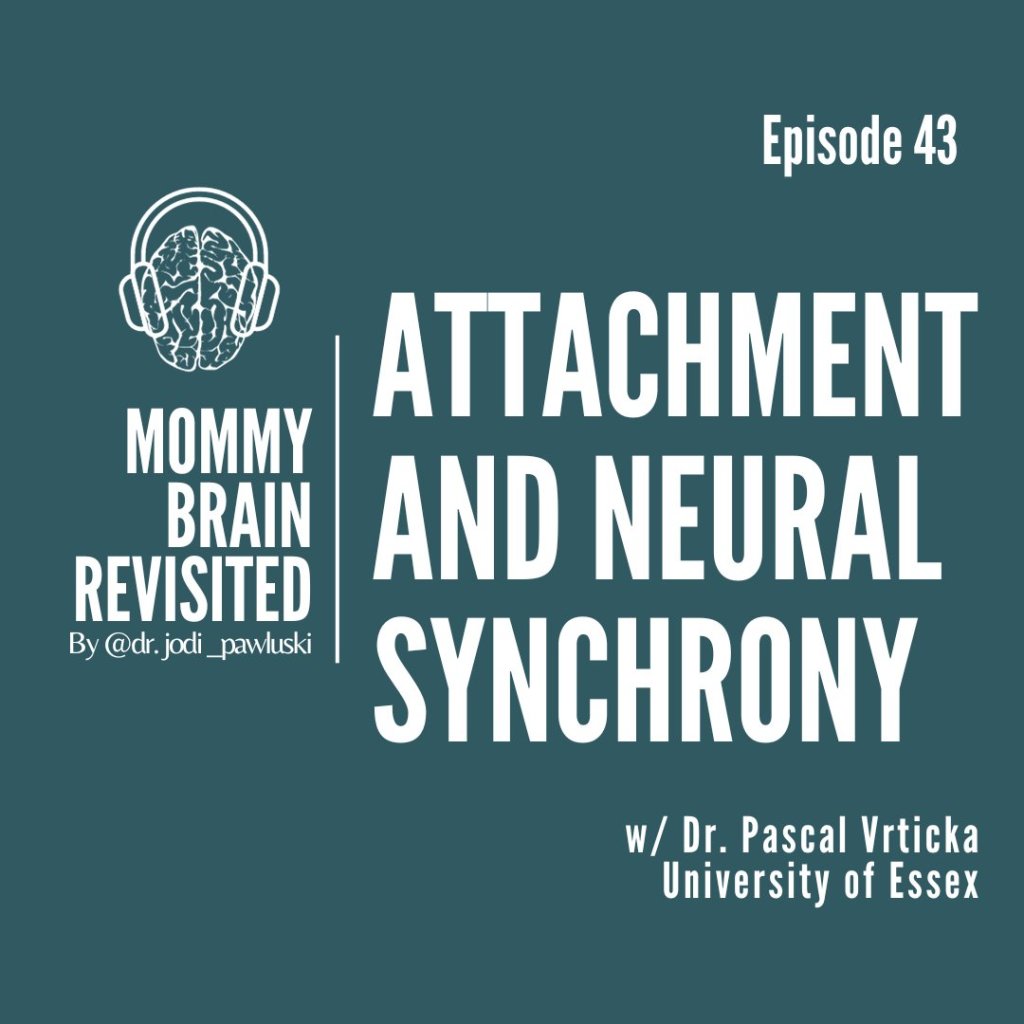
Podcast as part of Mommy Brain Revisited on “Attachment and Neural Synchrony” with Dr Vrticka as guest. Released on 05 October 2023.
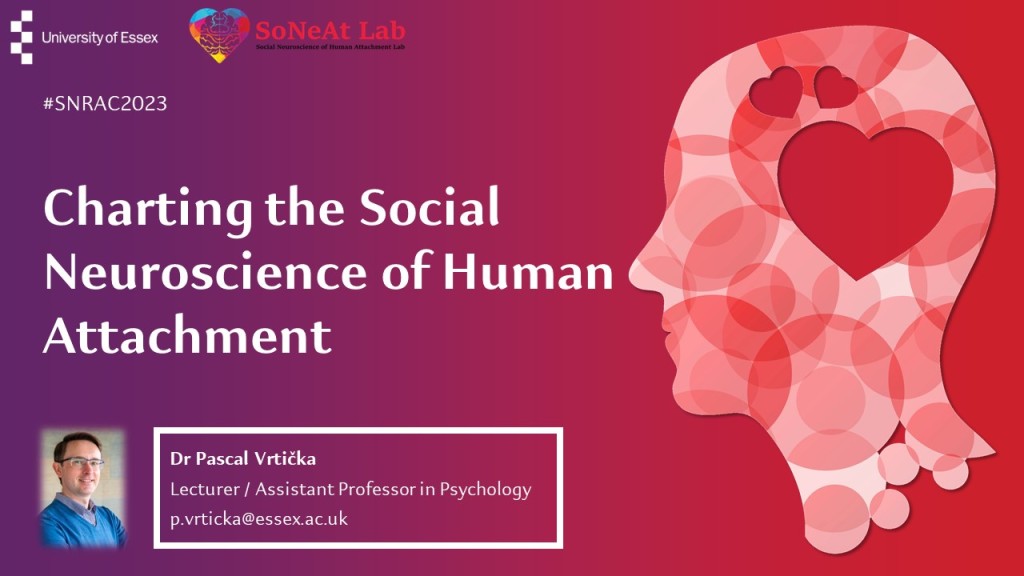
Keynote Lecture “Charting the Social Neuroscience of Human Attachment” presented by Dr Vrticka at the Social Neuroscience of Relationships, Attachment and Caregiving (SNRAC) Conference held at the University of Essex (Colchester, UK) on August 14, 2023.
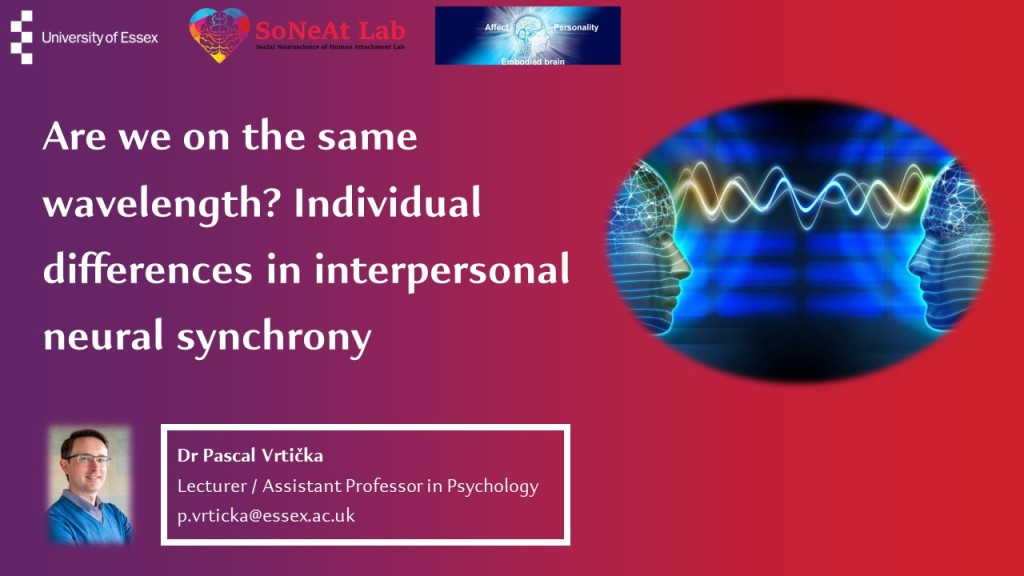
Invited Virtual Keynote “Are we on the same wavelength? Individual differences in interpersonal neural synchrony” presented by Dr Vrticka at the Affect, Personality and the Embodied Brain (APE) 2022 Meeting on September 22, 2022.
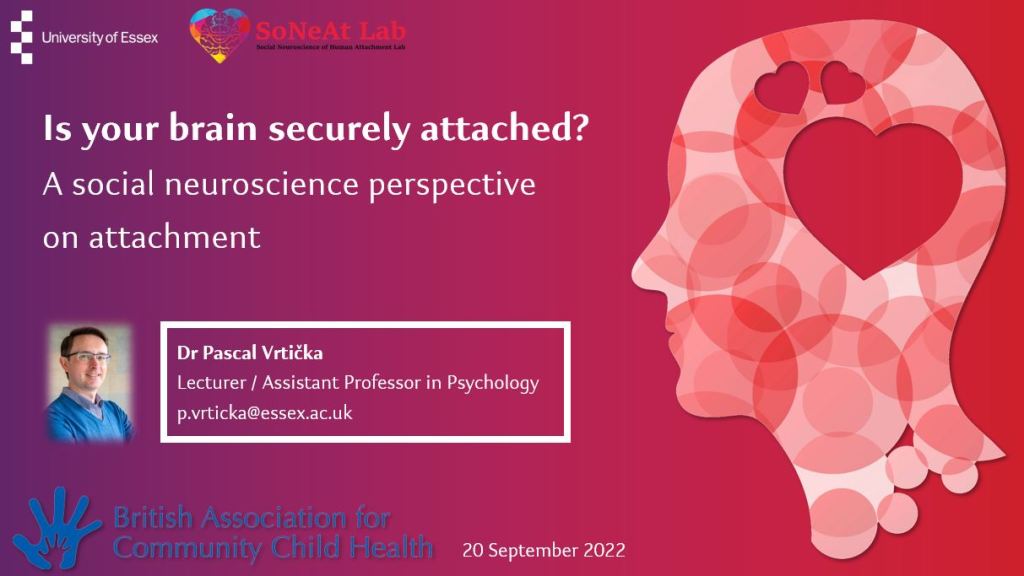
Invited Virtual Keynote “Is your brain securely attached? A social neuroscience perspective on attachment” presented by Dr Vrticka at the British Association for Community Child Health (BACCH) Annual Scientific Meeting 2022 on September 20, 2022.
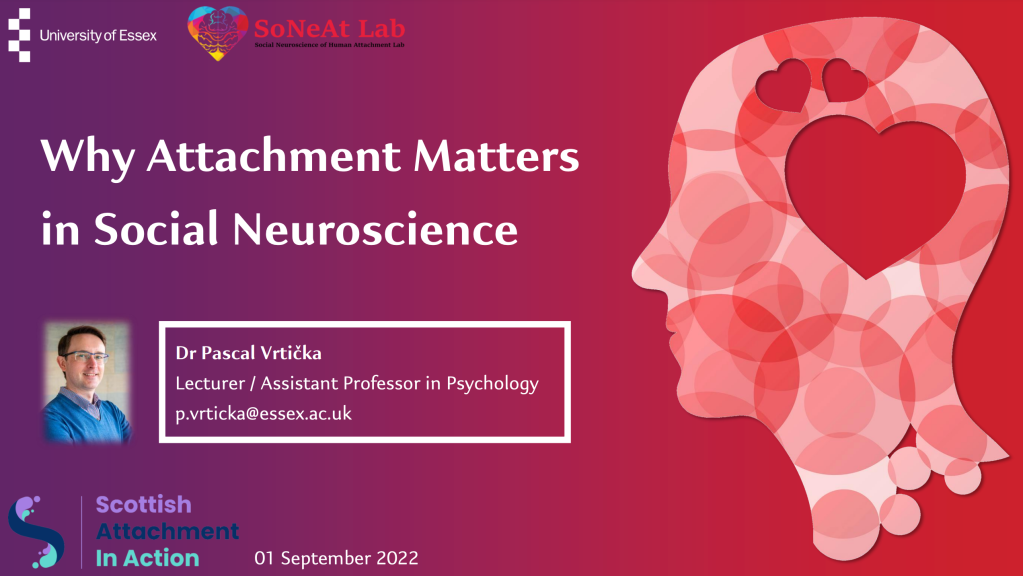
Invited Virtual Event: “Why attachment matters in social neuroscience” presented by Dr Vrticka for Scottish Attachment in Action (SAIA) on September 01, 2022. Due to a slight issue with the presentation recording, some slide content is not always visible. Slides can therefore be separately downloaded here. The accompanying blog post is available here.
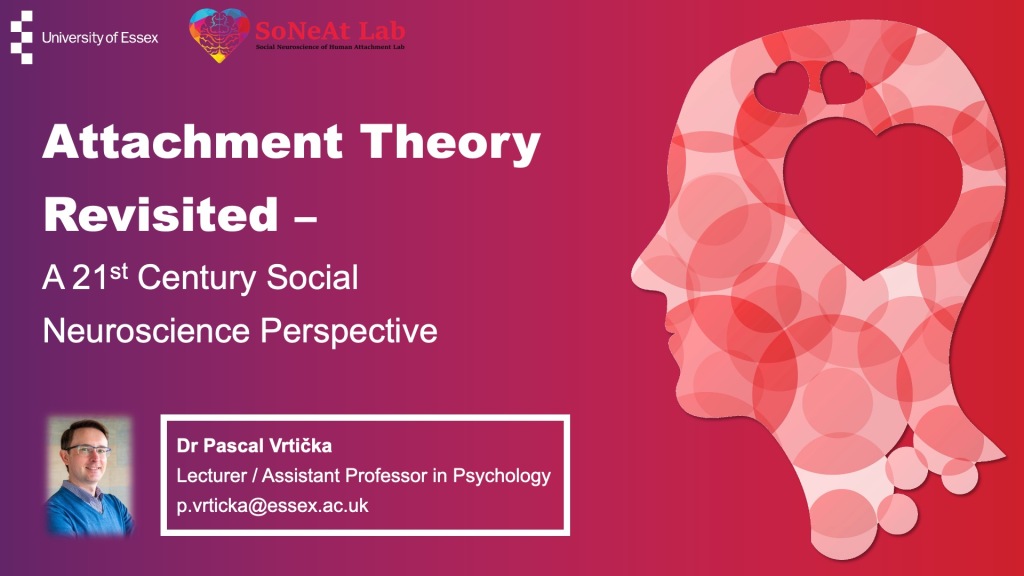
Invited Keynote Lecture “Attachment Theory Revisited – A 21st Century Social Neuroscience Perspective” presented by Dr Vrticka at the 23rd Psychology Days in Zadar, Croatia on May 26, 2022.
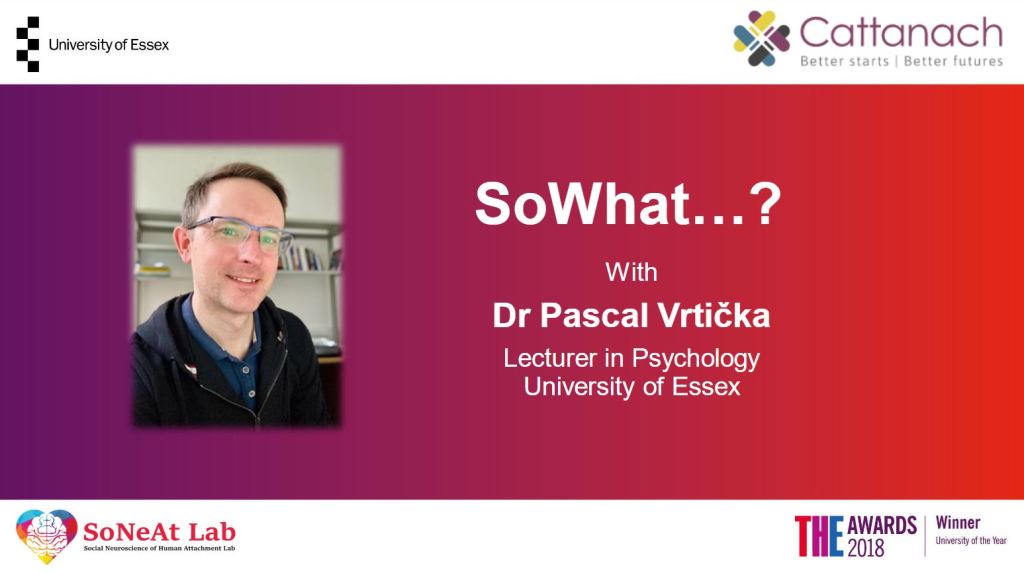
SoWhat? Knowledge Exchange Seminar on “Attachment and Dads” for Cattanach (an endowed charity in Scotland focusing on strengthening attachment, building resilience, and supporting prevention) presented by Dr Vrticka on February 22, 2022.

Invited talk “Le cerveau bien attaché: la base neuronale de l’attachement pendant l’adolescence” presented by Dr Vrticka at the Séminaire de recherche / Journée Scientifique organised by the Réseau Francophone – Thérapies basées sur la Mentalisation, based in Geneva, Switzerland on December 01, 2021. En Français / in French. Starts at 40min 55sec.

Invited talk “Towards a Social Neuroscience of Human Attachment” presented by Dr Vrticka at the Presidential Symposium: Understanding Psychophysiological Processes within a Developmental Science Framework as part of the 2021 Society for Psychophysiological Research (SPR) Virtual Annual Meeting (October 15, 2021).
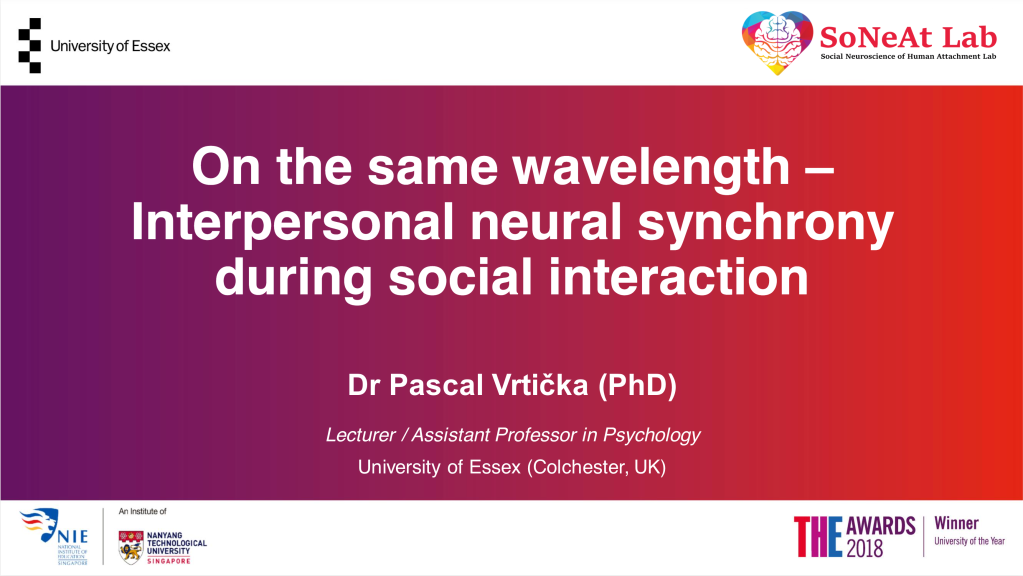
Invited talk “On the same wavelength – Interpersonal neural synchrony during social interaction” presented by Dr Vrticka at the Science of Education in Learning Series, Nanyang Technological University, Singapore (June 28, 2021). To access the video, scroll down to “SCIENCE OF LEARNING IN EDUCATION SEMINAR SERIES”.
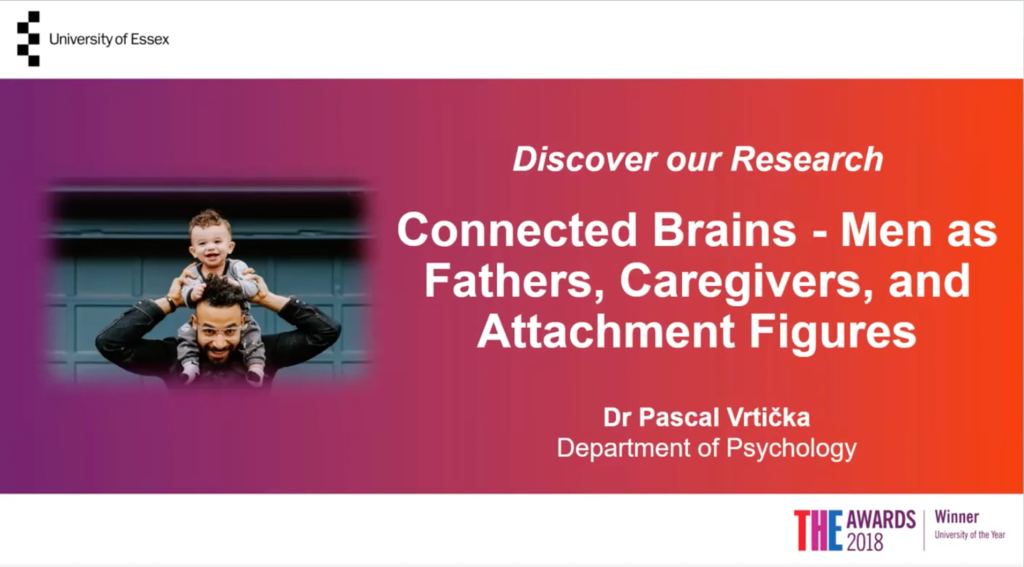
Postgraduate Virtual Week (University of Essex) virtual presentation by Dr Vrticka in May 2021. Talk title: Connected brains – men as fathers, caregivers, and attachment figures.
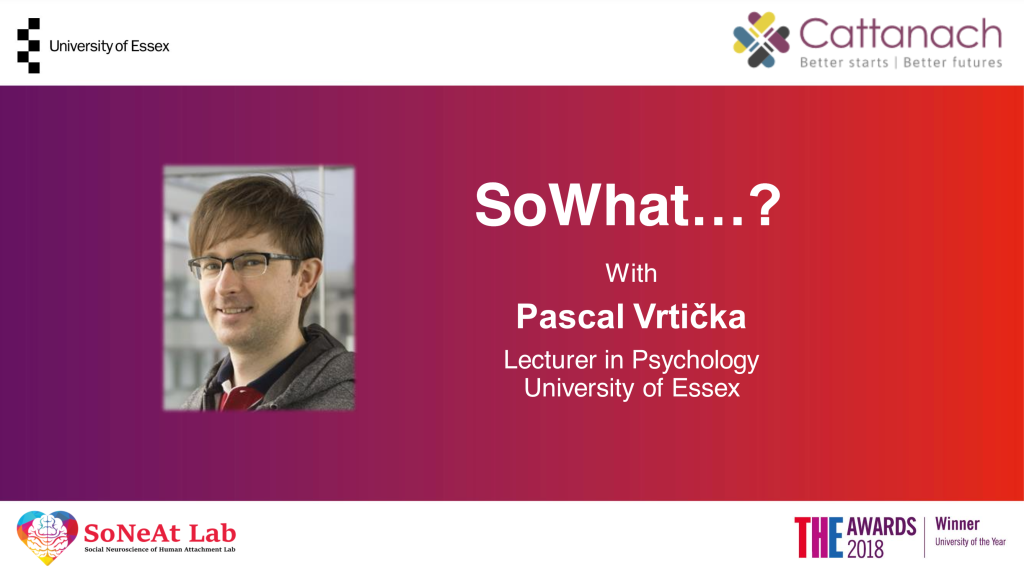
SoWhat? Knowledge Exchange Seminar for Cattanach (an endowed charity in Scotland focusing on strengthening attachment, building resilience, and supporting prevention) presented by Dr Vrticka (April 21, 2021).

Virtual Poster “On the same Wavelength: Assessing Interpersonal Neural Synchrony in Parent-Child Dyads using fNIRS Hyperscanning” presented by Dr Vrticka during BNA2021 – The British Neuroscience Association 2021 International Festival of Neuroscience (April 12, 2021).

Virtual Talk “Parent-Child Inter-Brain Coherence as a Potential New Biomarker for Relationship Quality, Attachment, and Caregiving” presented by Dr Vrticka as part of the Symposium “Understanding Dyadic Biobehavioral Synchrony: Developmental Precursors and Functions” during SRCD 2021 (April 07, 2021).

Virtual Seminar Lecture “Social Neuroscience – From 1st to 2nd Person Paradigms” presented by Dr Vrticka at the Gwangju Institute of Science and Technology (GIST), Gwangju, South Korea & Institute of Electrical and Electronics Engineers (IEEE), Gwangju Section, South Korea (March 18, 2021).

Dr Vrticka’s contribution to the University of Essex Department of Psychology Podcast Series “Understanding our Place in the World” (Dr Philip Cozzolino) with the title “The Importance of Social Connections and Interactions – A Social Neuroscientist’s Perspective” (October 23, 2020).
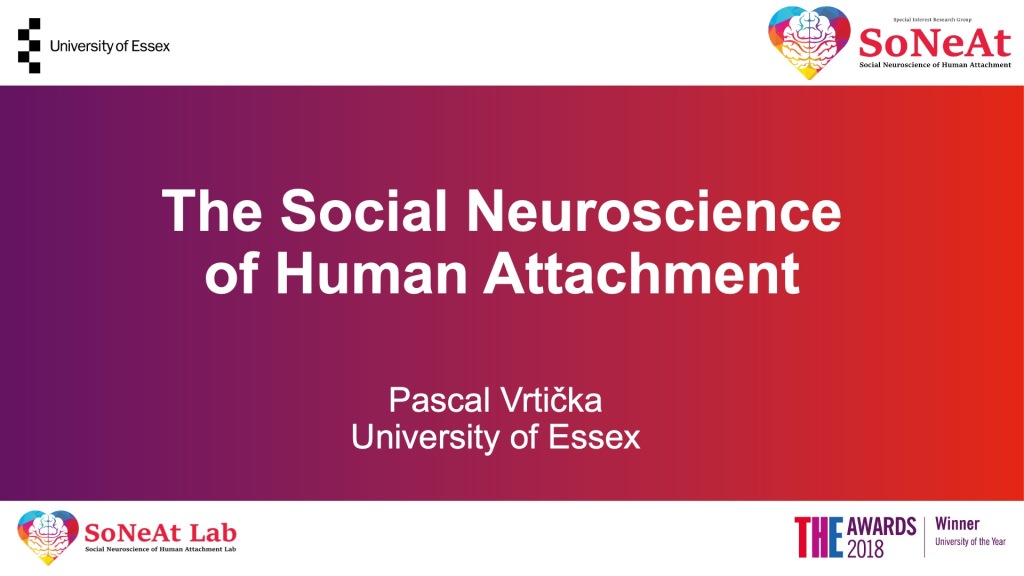
Virtual Keynote on “The Social Neuroscience of Human Attachment” presented by Dr Vrticka during the Conference Workshop – 70 Years of Attachment Research: A Multidisciplinary Social Neuroscience Perspective (August 12-13, 2020).

Virtual Keynote on “Bio-behavioural synchrony and inter-brain coherence: an attachment perspective” presented by Dr Vrticka during the NeuroSync 2020 Conference (June 13, 2020).
Keynotes / Special Events
•Invited Virtual Keynote Lecture at the Affect, Personality and the Embodied Brain Meeting – APE2022; September 22-23, 2022; Title: “Are we on the same wavelength? Individual differences in interpersonal neural synchrony”.
•Invited Keynote Lecture at the British Association for Community Child Health (BACCH) Annual Scientific Meeting 2022, Leicester, UK; September 20, 2022; Title: “Is your brain securely attached? A social neuroscience perspective on attachment”.
•Event at the British Science Festival 2022 – Making of the modern dad; Queen’s Building, Lecture Theatre 1.12, De Montfort University, Leicester, UK; September 13, 2022 at 12:00. Cancelled.
•Invited Keynote Lecture at the 23rd Psychology Days; May 26 – 27, 2022; University of Zadar, Croatia (conference link). Talk title: “Attachment Theory Revisited – A 21st Century Social Neuroscience Perspective“. Recording on Facebook.
•TEDx Talk at the “Are you paying attention?” event; May 14, 2022; University of Essex, Colchester, UK. Talk title: “Caring dads: The making of involved and confident fathers”. More information here.
•Invited talk at the Presidential Symposium: Understanding Psychophysiological Processes within a Developmental Science Framework as part of the 2021 Society for Psychophysiological Research (SPR) Virtual Annual Meeting. October 10-18, 2021. The symposium brought together four emerging leaders in developmental science who all seamlessly integrate biological processes to understand development. Dr Pascal Vrticka’s talk had the title: “Towards a Social Neuroscience of Human Attachment“.
Organised Conferences & Symposia
•Joint SIRG FCAR and SoNeAt Symposium: Advances in Research on Father-Child Relationships – an Attachment and Social Neuroscience Perspective at the International Attachment Conference (IAC) 2022; July 14 – 16, 2022; Lisbon, Portugal. Conference website.
•One-Day Hybrid Conference “Epigenetics Meets Social Neuroscience of Attachment; July 5, 2022; University of Essex, Colchester, UK. In Association with Project Alpha (Prof Tsachi Ein-Dor), Reichman University, Herzliya, Israel. Conference website.
•Virtual Mini-Conference within the Society for Emotion and Attachment Studies (SEAS) Mini-Conference Series 2021 – Attachment from a Social Neuroscience Perspective. September 23 -24, 2021. More information here.
•Virtual Conference Workshop – 70 Years of Attachment Research: A Multidisciplinary Social Neuroscience Perspective. August 12 – 13, 2020. The SoNeAt Workshop 2020, organised by SIRG SoNeAt president Dr Pascal Vrticka, brought together 150 attachment researchers from around the globe. During 8 keynotes by experts within the field as well as 10 plenary oral and 19 poster presentations from early career researchers, key concepts of attachment theory in association with social neuroscience as well as future avenues were discussed. For more information, see here. The keynote by Pascal Vrticka is available as a Video Recording.
•paEpsy (joint conference of the Sections Educational Psychology and Developmental Psychology of the German Psychological Society [DGPs]) 2019; September 9-12, Leipzig, Germany; Symposium on “Attachment Theory meets Social Neuroscience: The Biological and Brain Basis of Human Attachment”; Talk: “The Social Neuroscience of Human Attachment.
•Biennial International Attachment Conference (IAC) 2019; July 18-20, Vancouver, Canada. Invited symposium on “The Social Neuroscience of Human Attachment”.
•Biennial Meeting of the Society for Research in Child Development (SRCD) 2019; March 21-23, Baltimore, USA; Symposium on “The Influence of Parent-Child Interaction on Child Development: a Multi-Modal Social Neuroscience Approach”.
•Annual meeting of the German Society of Psychology (DGPs) 2018; September 17-20, Frankfurt, Germany; Symposium on “The Quality of Social Interactions within Parent-Child and Adult-Dyads: What are the influencing Factors in the Context of Attachment Theory?”.
•European Society for Social Cognitive Affective Neuroscience (ESCAN) Annual Meeting 2018; July 19-22, 2018, Leiden, The Netherlands; Symposium on “The Social Neuroscience of Human Attachment”.
•Society for Social Neuroscience Annual Meeting 2012; October 11-12, 2012, New Orleans, USA; Symposium on “The Neuroscience of Maternal Attachment and Attachment Style”; Talk: “The Neural Substrates of Attachment Insecurity”.
Invited Talks
•Virtual Seminar Talk; September 01, 2022; Scottish Attachment in Action (SAIA). Title: “Why Attachment Matters in Social Neuroscience”.
•Virtual Seminar Talk; June 17, 2022; Institute de Neurosciences de la Timone, Marseille, France. Title: “Two Neuroanatomical Models of Organised and Disorganised Human Attachment – NAMA and NAMDA”.
•Talk at Attachment Theory Workshop (Centre for Childhood Studies Pre-Launch); April 27, 2022; Department of Psychosocial and Psychoanalytic Studies, University of Essex, Colchester, UK. Topic: “Attachment theory – uses and limitations”. Talk Title: “Attachment theory and research within the 21st century – can social neuroscience help?
•Virtual Talk; March 24, 2022; Reichman University, Herzliya, Israel. Title: “Men as Fathers and Caregivers – An Attachment Perspective”.
•Special Clinical Psychology Trainee Lecture; March 21, 2022; Department of Clinical Psychology, University of Essex, Colchester, UK. Title: “Attachment: A Social Neuroscience Perspective”.
•Virtual “SoWhat?” Seminar; February 03, 2022; Cattanach.
•Virtual Seminar Talk; January 18, 2022; University of York, Department of Psychology. Title: “Attachment and Caregiving: New Insights from 1st and 2nd Person Social Neuroscience”.
•Virtual Conference Talk; December 01, 2021. Réseau Francophone – Thérapies basées sur la Mentalisation, Geneva, Switzerland; Séminaire de recherche / Journée Scientifique; Talk: “Le cerveau bien attaché: la base neuronale de l’attachement pendant l’adolescence”.
•Virtual Seminar Talk; June 28, 2021; Science of Education in Learning Series, Nanyang Technological University, Singapore; Talk: “On the same wavelength – Interpersonal neural synchrony during social interaction”.
•Virtual Seminar Talk; June 16, 2021; ABC Seminar Series – Leknes Affective Brain Lab, University of Oslo; Talk: “On the same wavelength – Interpersonal neural synchrony in parent-child dyads”.
•Virtual Seminar Lecture; March 25, 2021; Center for Social and Affective Neuroscience, Department of Clinical and Experimental Medicine, Linköping, Sweden; Talk: “On the same Wavelength: Assessing Interpersonal Neural Synchrony in Parent-Child Dyads using fNIRS Hyperscanning”.
•Virtual Seminar Lecture; March 18, 2021; Gwangju Institute of Science and Technology (GIST), Gwangju, South Korea & Institute of Electrical and Electronics Engineers (IEEE), Gwangju Section, South Korea; Talk: “Social Neuroscience – From 1st to 2nd Person Paradigms”. Available as a Video Recording.
•Virtual Student Lecture; July 3, 2020; International Max Planck Research School Neurosciences, University of Göttingen; Talk: “The Social Neuroscience of Human Attachment”.
•Virtual Conference Contribution; June 13, 2020; NeuroSync 2020; Talk: “Bio-behavioural synchrony and inter-brain coherence: an attachment perspective”. The talk is available as a YouTube video.
•Symposium Contribution; June 7, 2019; Conference “Congrès Français de Psychiatrie et de Psychopathologie de l’Enfant et de l’Adolescent”; Arcachon, France; Talk: “Le cerveau bien attaché : Les neurosciences sociales de l’attachement”.
•Talk; July 3, 2019; Prof. Dr. Stefanie Hoehl; Department of Developmental Psychology, University of Vienna, Austria; “The Social Neuroscience of Attachment: State-of-the-Art and Future Directions”.
•Kolloquium; April 16, 2019; Prof. Dr. Peter Zimmermann; Entwicklungspsychologie, Bergische Universität Wuppertal, Deutschland; „Bindungstheorie und soziale Neurowissenschaft“.
•Keynote talk; May 18, 2019; Conference on “The Future of Neuroscience, Attachment and Mentalizing: from research to clinical practice“; University College London (UCL); “The Social Neuroscience of Attachment: State-of-the-Art and Future Directions”.
•Kolloquium; January 28, 2019; Prof. Dr. Ute Kunzmann; Entwicklungspsychologie, Fakultät für Fakultät für Biowissenschaften, Pharmazie und Psychologie, Universität Leipzig, Deutschland; „Bio-behavioral Synchrony and attachment in parent-child relationships“.
•Advisory Board Meeting “Neuroscience Underlying Child Development”; January 16-17, 2019; Johnson & Johnson Consumer Inc., New Brunswick, NJ, USA; “Social Neuroscience and Attachment Theory: The Study of Parent-Child Interaction and Child Development”.
•Guest Lecture; December 10, 2018; Fiebach Laboratory for Cognitive Neuroscience, University of Frankfurt, Germany; “Attachment and Social Neuroscience” (German title: “Bindung & Soziale Neurowissenschaft).
•Main Speaker; November 13, 2018; Why do we cooperate? – An interdisciplinary workshop organized by the Leipzig Research Center for Early Child Development, University of Leipzig; “Attachment and Cooperation” (German title: “Bindung & Kooperation”).
•Guest Lecture; October 23, 2018; Lehrstuhl für Entwicklungspsychologie und Pädagogische Psychologie, Universität Erlangen-Nürnberg; “Bindungstheorie und Soziale Neurowissenschaft”.
•Main Speaker; October 07, 2018; Visions in Science VII – Science and Society; Berlin; “Social Neuroscience”.
•Talk; July 25, 2018; Department of Psychology, Lancaster University, UK; “Human Attachment: A combined Developmental Psychology and Social Neuroscience Perspective”.
•Research Colloquium; March 9, 2018; Department of Nursing, Second Faculty of Medicine, Charles University and Motol University Hospital, Prague, Czech Republic; “The Social Neuroscience of Attachment: State of the Art and Future Directions”.
•Research Colloquium; December 15, 2017; Prof. Dr. Kristina Musholt; Leipzig Research Center for Early Child Development, University of Leipzig, Germany; “A Social Neuroscience Perspective on Attachment Theory: State of the Art and Future Directions”.
•Vortragsreihe der Klinik und Poliklinik für Psychiatrie, Psychotherapie und Psychosomatik des Kindes- und Jugendalters; November 29, 2017; Dr. phil. Lars Otto White; Klinik und Poliklinik für Psychiatrie, Psychotherapie und Psychosomatik des Kindes- und Jugendalters, Universitätsklinikum Leipzig, Deutschland; „Das unsicher gebundene Gehirn“.
•Neuroscience Seminar; July 17, 2017; Prof. Euiseok Hwang; Gwangju Institute of Science & Technology, Gwangju, South Korea; “Social Neuroscience: What can it tell us about individual social agents and synchrony between social agents?”.
•Kolloquium; 22. Juni 2017; Prof. Dr. Ute Kunzmann; Entwicklungspsychologie, Fakultät für Fakultät für Biowissen-schaften, Pharmazie und Psychologie, Universität Leipzig, Deutschland; „Entwicklungspsychologie, Bindungstheorie und angewandte Bindungsforschung“.
•Forschungskolloquium; 16. Mai 2017; Prof. Dr. med. Kai von Klitzing; Klinik für Psychiatrie, Psychotherapie und Psychosomatik des Kindes/Jugendalters, Universitätsmedizin Leipzig; „Bindungstheorie & Soziale Neurowissenschaften: Fokus auf Jugendliche und Kinder“.
•Research Colloquium; April 28, 2016; Prof. Dr. Annekathrin Schacht; Courant Research Center “Text Structures“, Georg-August-Universität Göttingen, Germany; “Attachment Theory: Origins, concepts and applied research in humans”.
•Kolloquium; Lehrstuhl für Entwicklungspsychologie & Pädagogische Psychologie, Friedrich-Alexander Universität Erlangen-Nürnberg, Germany; April 21, 2015; Prof. Dr. Gottfried Spangler; “Eine neurowissenschaftliche Perspektive auf die Bindungstheorie”.
•Séminaire de maîtrise de l’Orientation psychologie clinique (link); Office médico-pédagogique & Faculté de Psychologie, Université de Genève, Geneva, Switzerland; December 17, 2014; Prof. Martin Debbané; “Attachment and the Social Brain during Adolescence: Potential Links to Developmental Psychopathology”.
•Research Colloquium; Courant Research Center “Text Structures“, Georg-August-Universität Göttingen, Germany; December 03, 2014; Prof. Dr. Annekathrin Schacht; “Emotion Perception in Humans: The Role of Valence / Intensity, Social Context, Novelty and Prediction (Error)”.
•Fort-/Weiterbildung Klinik für Psychiatrie und Psychotherapie (PSA) und Klinik für Psychosomatik und Psychotherapie (PSY); October 14, 2014; Frau Dr. med. Anderssen-Reuster, Städtisches Krankenhaus Dresden-Neustadt, Dresden, Germany; “Das soziale Gehirn – Bindungstheorie im Rahmen der sozialen Neurowissenschaften”.
•Laboratory Visit; January 13, 2014; Prof. Tania Singer; Department of Social Neuroscience, Max Planck Institute for Human Cognitive and Brain Sciences, Leipzig, Germany; “Individual Differences in Social Emotion Processing”.
•Behavioral Psychiatry & Neuroimaging Laboratory Lab Meeting; May 22, 2013; Dr. Martin Debbané and Prof. Stephan Eliez; University of Geneva, Switzerland; “The Neural Substrates of Mentalizing in Adolescence: Influence of Personality, Age, Sex and IQ”.
•CISA Seminar Series; May 21, 2013; Swiss Center for Affective Sciences, Geneva, Switzerland; “The Neural Basis of Humor Appreciation in Humans”.
•Neuroscience Seminar; March 7, 2012; Prof. Jong-Seok Lee, Yonsei Institute of Convergence Technology, Yonsei University, Incheon, South Korea; “The Social Emotional Brain”.
•Neuroscience Seminar; February 23, 2012; Prof Jin-Hun Sohn, Brain Research Institute, Chungnam National University, Daejeon, South Korea; “Emotion Recognition: About Social Influence, Personality, and Predictability”.
•Laboratoy Visit; June 29-30, 2011; EOS-Klinik für Psychotherapie, Münster, Germany; “Die (Neuro)Biologischen Grundlagen des Menschlichen Bindungsverhaltens”.
•Presentation & Round Table Discussion; March 18, 2011; “International Brain Awareness Week 2011“; Geneva, Switzerland; “Attachement parental et son influence sur le développement de l’enfant”.
•Symposium Contribution; March 14, 2011; “Stress, the Social Brain and Psychopathology“; EPFL, Lausanne, Switzerland; “Perception and Regulation of Social Emotions”.
•Laboratory Visit; November 1-2, 2010; Prof. Sonia Bishop, Affective Cognitive Neuroscience Lab, UC Berkeley, CA, United States of America; “The Human Social Brain: Insights from Attachment and Appraisal Theories”.
•Presentation & Round Table Discussion; September 15, 2010; Programme doctoral romand en Psychologie; University of Lausanne, Lausanne, Switzerland; “Psychologie et disciplines voisines: complémentarité, coopération ou compétition? Imagérie en Résonance Magnétique Fonctionnelle”.
•Neuroscience Seminar; July 12, 2010; Prof. Jin-Hun Sohn, Brain Research Institute, Chungnam National University & ETRI, Daejeon, South Korea; “The Human Social Brain: Insights from Social Cognitive & Affective Neuroscience”.
•Neuroscience Seminar; July 13, 2010; Prof Jin-Hun Sohn, Brain Research Institute, Chungnam National University & KRISS, Daejeon, South Korea; “Research on Emotions in Switzerland”.
•Seminar in Biological Psychology; May 19, 2010; HU Berlin, Germany; “Shading Light into the Dark Matter of Social Neuroscience: How the Human Brain processes Social vs. Non-Social Information”.
Oral Conference Contributions
•SRCD 2021 Symposium Contribution “Understanding Dyadic Biobehavioral Synchrony: Developmental Precursors and Functions”; April 07, 2021; Virtual; Talk: “Parent-Child Inter-Brain Coherence as a Potential New Biomarker for Relationship Quality, Attachment, and Caregiving”.
•The First official European Congress on Clinical Psychology and Psychological Treatment of EACLIPT 2019; October 31 – November 2, Dresden, Germany; Symposium contribution, Symposium: “Crucial elements of social understanding and relationship quality- implications for mental health”; Talk: “Inter-brain coherence during parent-child interaction: a new measure for relationship quality?”.
•18th International Congress of the European Society for Child and Adolescent Psychiatry (ESCAP) 2019; June 30-July 2, Vienna, Austria; Talk: “Does caregiver-child relationship quality predict bio-behavioral synchrony during collaborative problem solving? An fNIRS investigation” within the Symposium “Parenting, brain development and developmental psychopathology”.
•2019 Annual Meeting of the Organization for Human Brain Mapping (OHBM); June 9-13, Rome, Italy; Oral session & poster presentation by Lara Puhlmann; Title: “Telomere length change over nine months relates to multimodal measures of brain structure”.
•Biennial Meeting of the Society for Research in Child Development (SRCD) 2019; March 21-23, Baltimore, USA; Talk: “The Neural Substrates of Attachment-Derived Internal Working Models (IWMs) across Human Development” within the Symposium “Attachment and social cognition – a bio-psychological perspective from infancy to early adulthood”.
•Consortium of European Research on Emotion (CERE) conference; April 4-5, 2018, Glasgow, UK. Talk: “Spatio-Temporal Pattern of Appraising Social and Emotional Relevance: Evidence from Event-Related Brain Potentials”.
•International Symposium for Affective Touch in Children and Adolescents (ISATCA); February 1-2, 2018, Dresden, Germany; Talk: “Epigenetic Modification of the Oxytocin and Glucocorticoid Receptor Genes is linked to Attachment Avoidance in young Adults”.
•Consortium of European Research on Emotion Conference 2014; March 27-28, 2014, Berlin, Germany; Symposium on “Attachment Insecurity and Social Emotion Perception”; Talk: “The Influence of Attachment Insecurity on Brain Activity during Social Emotion Perception”.
•3rd Annual Stanford Postdoctoral Research Symposium: Empowering Future Leaders; October 11, 2013, Stanford University, CA, USA; “The influence of attachment style on social brain function”.
•Society for Social Neuroscience (S4SN) Annual Meeting 2012; October 11-12, 2012, New Orleans, USA; Symposium on “The Neuroscience of Maternal Attachment and Attachment Style”; Talk: “The Neural Substrates of Attachment Insecurity”.
•16th General Meeting of the European Association of Social Psychology 2011; July 12-16, 2011; Stockholm, Sweden; “Angry Face or Tasty Cake? Interactive Processing of Valence and Social Content within the Human Amygdala”.
•CIBM Research Day 2011; April 20, 2011; University of Geneva, Switzerland; “Amygdala response to facially expressed novelty and valence”.
•Consortium of European Research on Emotion (CERE) Conference 2010; April 22 – 24, 2010; Lille, France; “How Attachment Style and Context modulate Emotion Elicitation and Regulation in the Processing of Social Stimuli”.
•Annual Research Forum of the Swiss Center of Affective Sciences; March 22- 23, 2010; Geneva, Switzerland. “Relevance, Individual Differences, and Borderline Personality Disorder: Past Work inspiring Future Studies.”
•Annual Research Forum of the Swiss Center of Affective Sciences; July 6 – 7, 2009; Geneva, Switzerland; “Differential Brain Activation during Regulation of Social and Non-Social Emotions”.
•Samedi de l’UNIGE: “Le cerveau à livre ouvert”; March 23, 2009; Geneva, Switzerland; “Amour et Attachement dans le Cerveau”.
•Alpine Brain Imaging Meeting (ABIM), January 11 – 15, 2009; Champéry, Switzerland; “Differential Brain Activation during Regulation of Social and Non-Social Emotions”.
•Annual Research Forum of the Swiss Center of Affective Sciences; April 3, 2008; Geneva, Switzerland; “Influences of Adult Attachment on Social Appraisal and Emotion Regulation”.
•Lemanic-Neurosciences Doctoral School Annual Meeting (LNAM), September 14 – 15, 2007; Les Diablerets, Switzerland; “Human amygdala and striatum activation during social appraisal is modulated by attachment style”.
•Annual Research Forum of the Swiss Center of Affective Sciences; April 11 – 12 2007; Geneva, Switzerland; “Effects of social relevance and context on the perception of emotional facial expressions”.
Conference Posters
•Society of fNIRS Virtual Conference 2021; October 18-22, 2021; Poster: “Parent-child interpersonal neural synchrony: A new biomarker for relationship quality, attachment, and caregiving?”.
•BNA2021 – The British Neuroscience Association 2021 International Festival of Neuroscience; April 12-15, 2021; Poster: “On the same Wavelength: Assessing Interpersonal Neural Synchrony in Parent-Child Dyads using fNIRS Hyperscanning”.
•7th MindBrainBody (MBB) Symposium 2019, March 18-19, Berlin, Germany; Poster by Madison Long “Investigating the association between hypothalamic volume and attachment in fathers” & Poster by Sonja Sudimac “The neural correlates of social exclusion in fathers: is there an association with attachment?”.
•Budapest CEU Conference on Cognitive Development (BCCCD 2019); January 3-5, Budapest, Hungary; Poster by Trinh Nguyen “Bio-Behavioural Synchrony during Caregiver-Child Problem-Solving”.
•International Attachment Conference (IAC) Biannual Meeting 2017, June 29 – July 1, 2017; London, UK: “The neural basis of trait attachment insecurity in adults, adolescents, and children”.
•Organization of Human Brain Mapping (OHBM) Annual Meeting 2016; June 26-30, 2016; Geneva, Switzerland: “Pain Analgesia induced by three Meditation-Based Instructions: Effects of a 9-Month Mental Training”.
•Cognitive Neuroscience Society (CNS) Annual Meeting 2014; April 5-8, 2014; Boston, USA: “The Neural Basis of a Sense of Humor in Children”. Poster presented by Jessica Black. See here for a blog post by @CogNeuroNews about the poster content.
•International Society for the Research on Emotion (ISRE) Biannual Meeting 2013; August 2-5, 2013; University of California Berkeley, California, USA: “Neural substrates of social appraisal in adolescence: The influence of personality, age, and sex”.
•Research Day of the Centre d’Imagérie Biomédicale (CIBM) & Brain and Behavior Laboratory (BBL) 2013; May 22, 2013; University of Geneva, Geneva, Switzerland; “How an Insecure Attachment Style affects Brain Activity during Mentalizing in Adolescents”.
•Implications of Research on the Neuroscience of Affect, Attachment and Social Cognition; May 18-19, 2013; The Psychoanalysis Unit, UCL, London, UK; “How an Insecure Attachment Style affects Brain Activity during Mentalizing in Adolescents”.
•Cognitive Neuroscience Society (CNS) Annual Meeting 2013; April 13 – 16, 2008; San Francisco, USA; “Sex-Differences during Humor Appreciation in Child-Sibling Pairs”.
•Society for Affective Neuroscience (SANS) Annual Meeting 2013; April 12-13, 2013; San Francisco, USA; “Humor Appreciation in Children: The Influence of Temperament, Age and IQ”.
•Society for Neuroscience (SfN) Annual Meeting 2012; October 13-17, 2012; New Orleans, USA; “Human Amygdala Response to Dynamic Facial Expressions of Positive and Negative Surprise”.
•Annual Research Forum of the Swiss Center of Affective Sciences; June 28, 2011; University of Geneva, Switzerland; “How the Human Amygdala processes Positive and Negative Surprised Faces: Is it all about Prediction Errors?”.
•Implications of Research on the Neuroscience of Affect, Attachment and Social Cognition; May 6-7, 2011; The Psychoanalysis Unit, UCL, London; “First insights into the neural correlates of avoidant attachment style in healthy adults”.
•The Social Brain: Evolution, development, psychopathology and future directions; April 12-13, 2011; MRC Cognition and Brain Sciences Unit, Cambridge, England; “Lateralized interactive encoding of valence and social content within the human amygdala”.
•Annual Research Forum of the Swiss Center of Affective Sciences; February 14, 2011; Geneva, Switzerland; “Lateralized Valence and Social Content Processing within the Human Amygdala”.
•4th Annual Meeting of the Social & Affective Neuroscience Society (SANS); October 29 – 21, 2010; Chicago, IL, United States of America; “Interactive Encoding of Emotional and Social Relevance within the Human Amygdala”.
•Alpine Brain Imaging Meeting (ABIM), January 10 – 14, 2010; Champéry, Switzerland; “The Influence of Adult Attachment Style on the Experience and Regulation of Social Emotions: a fMRI Study”.
•Lemanic-Neurosciences Doctoral School Annual Meeting (LNAM), November 27, 2009; Morges, Switzerland; “The Influence of Adult Attachment Style on the Experience and Regulation of Social Emotions: a fMRI Study”.
•Federation of European Neurosciences (FENS) Forum, July 12 – 16, 2008; Geneva, Switzerland; “Making friends or foes: neural correlates of social memory”.
•Cognitive Neuroscience Society (CNS) Annual Meeting 2008; April 12 – 15, 2008; San Francisco, United States of America; “Human amygdala and striatum activation during social appraisal is modulated by attachment style”.
•Alpine Brain Imaging Meeting (ABIM), January 13 – 17, 2008; Champéry, Switzerland; “Memory for friends or foes: Neural correlates of implicit affective person knowledge in face perception”.
•Alpine Brain Imaging Meeting (ABIM), January 14 – 19, 2007; Champéry, Switzerland; “How context significance can change perception of facial expressions and subsequent memory: a fMRI study”.
•Lemanic-Neurosciences Doctoral School Annual Meeting (LNAM), September 8 – 9, 2006; Les Diablerets, Switzerland; “How context significance can change perception of facial expressions and subsequent memory: a fMRI study”.